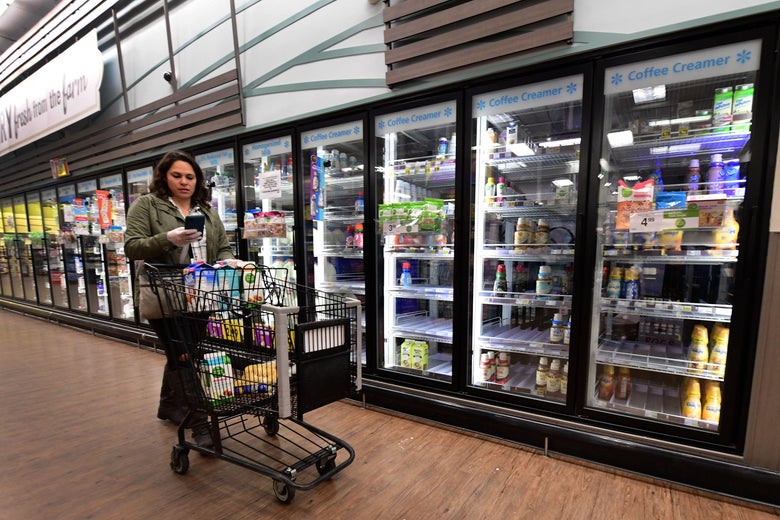
Instacart employee Monica Ortega checks her cellphone for orders.
FREDERIC J. BROWN/AFP via Getty Images
Workers for Instacart and Amazon are striking on Monday to demand stronger health protections and better pay. Instacart’s gig workers nationwide will be refusing orders to pick up and deliver groceries, while Amazon warehouse employees in Staten Island are walking off their jobs.
Shipping and delivery workers have become a lifeline for millions who remain cloistered at home to slow the spread of COVID-19. These workers must still physically go to work and risk exposure to the virus. Instacart’s shoppers are seeking an additional $5 per order in hazard pay, a default 10 percent tip amount in the app, more access to paid sick leave for people who have pre-existing conditions or get sick, and company-provided protective materials – namely soap, hand sanitizer, and disinfectant wipes and sprays at a minimum. “We will not risk our safety, our health, or our lives for a company that fails to adequately protect us, fails to adequately pay us, and fails to provide us with accessible benefits should we become sick,” reads a Medium post on the strike from the Gig Workers Collective, an organization founded by two Instacart shoppers. The post also alleges that Instacart is not honoring its promise to gives workers up to two weeks of sick pay if they become ill or have to self-quarantine.
Instacart has seen a dramatic uptick in business. The company announced last week that it was hiring 300,000 more contractors. Instacart provided a statement to Vice responding to the strike:
The health and safety of our entire community — shoppers, customers, and employees — is our first priority. Our goal is to offer a safe and flexible earnings opportunity to shoppers, while also proactively taking the appropriate precautionary measures to operate safely. We want to underscore that we absolutely respect the rights of shoppers to provide us feedback and voice their concerns. It’s a valuable way for us to continuously make improvements to the shopper experience and we’re committed to supporting this important community during this critical time.
Like Instacart, Amazon is seeing a surge of orders similar to what it would see on Prime Day or Black Friday, spurring the company to open 100,000 new full and part-time positions in the U.S. to help keep up with demand and offer $2 per hour raises through April. But Amazon warehouse workers say they’re not being protected as the virus spreads. Anywhere from 50 to 200 Amazon warehouse workers at the company’s Staten Island facility are also striking at 12:30 p.m. and pursuing similar demands after news broke last week that there was a confirmed case of COVID-19 at the location. The leader of the walkout, Christian Smalls, claimed to CNN that as many as five to seven people at the warehouse have actually tested positive. Strikers are calling on Amazon to close the Staten Island warehouse for an extended deep cleaning and give workers paid time off during that period. (Amazon says it has been cleaning the facility more frequently and thoroughly, but has not opted to temporarily close it down.) The workers also want the company to give workers more access to sick leave.
The company provided a statement on the strike to Business Insider:
Like all businesses grappling with the ongoing coronavirus pandemic, we are working hard to keep employees safe while serving communities and the most vulnerable. We have taken extreme measures to keep people safe, tripling down on deep cleaning, procuring safety supplies that are available, and changing processes to ensure those in our buildings are keeping safe distances.
The two Monday strikes follow a number of similar employee protests last week. Purdue Farm employees walked off a chicken production line in Perry, Georgia due to concerns that the company was not sanitizing the facility well enough and a pay dispute. Pittsburgh, Pennsylvania sanitation workers held a rally two days later, refusing to pick up trash until they received better safeguards from the city such as access to masks and hazard pay for covering co-payments.
As delivery-based companies see a huge boom in business, the workers they depend on are putting their foot down. As the Instacart workers’ Medium post reads, “They are putting us directly in harm’s way while profiting greatly. We cannot let this be considered normal.”
Readers like you make our work possible. Help us continue to provide the reporting, commentary and criticism you won’t find anywhere else.
Join Slate Plusfrom Slate Magazine https://ift.tt/2xyhkqj
via IFTTT
沒有留言:
張貼留言